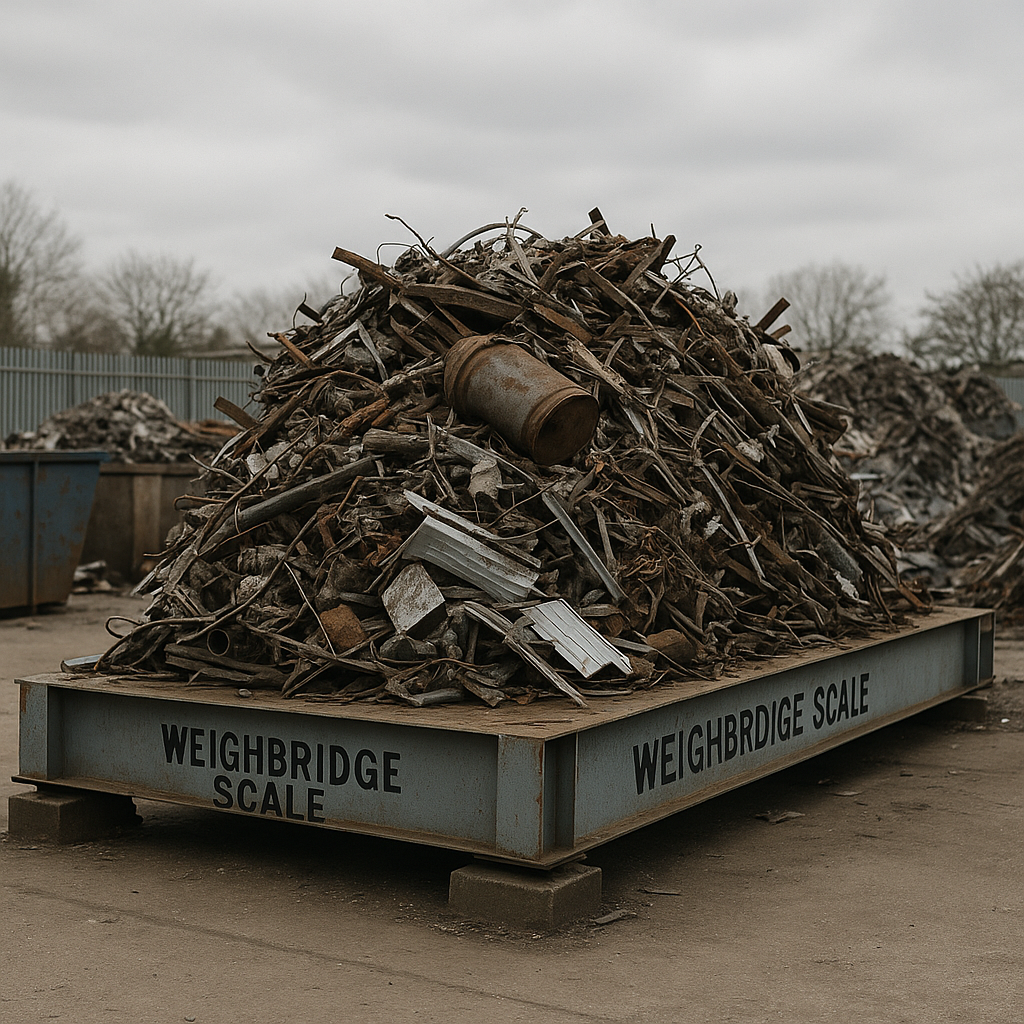5901 Botham Jean Blvd, Dallas, TX 75215
What Are the Commercial Scrap Metal Regulations in Dallas?
August 9, 2025Understanding the commercial scrap metal industry in Dallas requires familiarity with local regulations. These rules are in place to prevent theft, ensure proper documentation, and maintain environmental standards during the recycling process. For businesses operating in this sector, compliance is not optional—it is essential for legal operation.
Dallas commercial scrap metal recyclers must adhere to specific regulatory requirements under Texas law. These regulations cover documentation, identification procedures, payment methods, and materials handling. They apply to recycling facilities, salvage yards, and any business involved in buying or processing scrap metal for resale or reprocessing.
The city’s approach aligns with Texas state laws, which provide clear guidelines for metal recycling entities. Understanding these requirements helps businesses avoid penalties while supporting legitimate recycling efforts that benefit both the economy and the environment.
What Are the Key Purchase Restrictions for Scrap Metal Recyclers?

Dallas scrap metal recyclers operate under strict purchase guidelines designed to prevent theft and ensure responsible recycling practices. Understanding these restrictions is essential for both businesses and individuals looking to sell scrap metal in the city.
The fundamental restrictions involve when and from whom recyclers can purchase materials. Secondary metals recyclers in Dallas face several key limitations governing their daily operations.
Operating Hours and Seller Requirements
City ordinances establish clear boundaries for scrap metal transactions. Recyclers must follow specific rules regarding business hours and seller qualifications:
- Transactions can only occur between 7:00 AM and 7:00 PM
- Recyclers cannot purchase from intoxicated persons
- Sellers must deliver materials via motor vehicle or trailer attached to a vehicle
- Valid identification must be presented and recorded for each transaction
These restrictions on time and sellers help authorities monitor transactions and reduce opportunities for illegal activities like metal theft, which costs businesses and municipalities millions of dollars annually.
Regulated Metal Property Requirements
Certain items are classified as regulated metal property and require additional documentation before recyclers can accept them. Sellers must provide proof of ownership or proper authorization for these materials.
Items requiring special documentation include:
- Manhole covers and water meter covers
- Electric light poles and utility structures including fixtures and hardware
- Guard rails and street signs
- Traffic signals and their fixtures
- Communication and transmission wires
- Funeral markers and vases
- Historical markers
- Railroad equipment (tie plates, signal houses, control boxes)
- Items marked with government, utility, cemetery, or railroad identifiers
- Copper or aluminum air conditioning coils
- Catalytic converters or parts thereof
For these regulated items, sellers must present receipts, bills of sale, or documentation proving they are authorized representatives of entities that legally own the materials.
Payment and Hold Restrictions
After accepting materials, recyclers face additional limitations regarding payment and processing:
- Many regulated metals cannot receive immediate cash payment
- Payments over certain limits must be made by check or electronic transfer
- Purchased regulated metal property must be held for five days (excluding weekends and holidays) before processing
- Materials must be segregated by seller and properly labeled during the holding period
- The chief of police can extend hold periods up to 60 days if materials are suspected stolen
These payment and processing restrictions create a paper trail and provide law enforcement with time to investigate potentially stolen materials.
For recyclers, these restrictions represent important compliance requirements. Violations can result in fines, license suspension, or even criminal charges in severe cases. For sellers, understanding these restrictions helps ensure a smooth and legal transaction when recycling scrap metal in Dallas.
What Are the Holding Period and Documentation Requirements?

Dallas regulations establish specific holding periods for recycling businesses dealing with regulated metal property. Secondary metals recyclers must retain purchased regulated metal property at their local place of business for five days after purchase, excluding weekends and holidays. This mandatory holding period allows authorities time to investigate potentially stolen materials while maintaining legitimate business operations.
The five-day holding requirement is a significant deterrent to metal theft. During this time, recyclers must keep the materials untouched—no altering, processing, reselling, disposing, removing, or salvaging is permitted. Exceptions occur only when property is released earlier by a written order from the police chief or a court order from a competent jurisdiction.
Besides holding the materials, recyclers must follow specific segregation and labeling protocols. Each batch of regulated metal property must be kept separate from materials purchased from other sellers. Each segregated batch requires a label indicating the seller’s name, purchase date, and receipt number documenting the transaction. For bulk purchases containing multiple items of the same type, only one representative item from each category needs segregation and labeling.
Record-keeping is another critical component of compliance. Secondary metals recyclers must maintain detailed transaction records for three years after purchase. These records must include comprehensive seller identification, property descriptions, and transaction details. For catalytic converters specifically, records must document the volume sold, the seller’s name, and transaction date.
Transparency with law enforcement is mandatory. Recyclers must make all regulated metal property available for inspection by any police officer at their place of business during normal business hours. This accessibility extends to all transaction records, which must be readily available for review upon request.
Certain ferrous metal materials may be exempt from these requirements unless specifically designated by the police chief. The chief periodically reviews theft statistics on ferrous regulated metal property and may establish lists of items subject to the holding, segregation, and labeling requirements.
Compliance with these requirements isn’t optional. Violations of Chapter 40B of the Dallas City Code can result in fines up to $500 per item of regulated metal property involved. Each piece of non-compliant metal property constitutes a separate offense, potentially leading to substantial penalties for widespread violations.
For recycling businesses, implementing robust inventory tracking systems is essential. Proper segregation areas, clear labeling protocols, and secure record storage help ensure compliance and minimize potential issues during inspections.
| Requirement | Description |
|---|---|
| Operating Hours | Transactions can occur only between 7:00 AM and 7:00 PM |
| Seller Requirements | Sellers must deliver materials via motor vehicle; valid identification required |
| Documentation for Regulated Items | Proof of ownership or authorization required for items like manhole covers, street signs, etc. |
| Payment Restrictions | Immediate cash payments not allowed without a cash transaction card; payments generally made via check or electronic transfer |
| Holding Period | Purchased regulated metal property must be held for 5 days before processing |
| Segregation and Labeling | Materials must be segregated by seller and properly labeled during the holding period |
The documentation and holding period requirements create a system of accountability that allows legitimate recycling businesses to operate while providing law enforcement with tools to identify and recover stolen materials. This balanced approach supports both business operations and community safety priorities.
How Are Payments Regulated for Scrap Metal Transactions?

Dallas enforces strict regulations on how recyclers pay sellers for regulated metal property. These restrictions aim to reduce metal theft and ensure transparent transaction records. The city’s ordinances specifically limit cash payments and set clear protocols for buyers and sellers.
According to Dallas City Code Chapter 40B, secondary metals recyclers are prohibited from providing immediate cash payments for most regulated metal property. Instead, they must use alternative methods that document and verify the seller’s identity.
Standard Payment Requirements
For most scrap metal transactions in Dallas, recyclers must pay sellers through these methods:
When a seller brings regulated metal to a recycling facility, the recycler cannot provide cash immediately. Payments must be sent as a check or debit card to the seller’s physical address listed in their ID documents. This creates a cooling-off period, deterring theft and allowing for transaction tracing.
This mailing requirement applies to all regulated metal transactions unless the seller has a cash transaction card. Recyclers must keep records of payment details, including check copies or debit card receipts, with the purchase records for at least three years.
Cash Transaction Card Exception
Dallas ordinances permit immediate payment using cash or debit cards only when the seller presents a valid cash transaction card, which serves as pre-verification of the seller’s identity. To obtain a cash transaction card:
The seller must complete an application including their name, address, sex, birthdate, and details from a valid government-issued photo ID. The application must also have a clear digital photo of the seller and a legible thumbprint. A recycler representative must approve the application.
The recycler can only issue or renew the card by mailing it to the seller’s street address listed on the application. This prevents the misuse of false addresses. Cash transaction cards are non-transferable and valid for a maximum of two years.
Verification and Enforcement
When a seller presents a cash transaction card, recyclers must verify that the ID matches the card information. If a card is invalidated, the recycler must notify the police chief by the next business day, and the police alert other recyclers.
Recyclers must keep all cash transaction card applications and copies for at least two years after issuance or renewal. Police officers can inspect these records during normal business hours.
For ferrous metals (those containing iron), these payment restrictions might not apply unless specified by the chief of police. The police department maintains a list of ferrous metal items subject to these restrictions and informs recyclers of updates.
| Payment Option | Description |
|---|---|
| Check by Mail | Payment is mailed as a check to the seller’s address per their ID documents. |
| Debit Card by Mail | Debit card payment is mailed to the seller’s address per their ID documents. |
| Cash Transaction Card | Allows immediate cash or debit payment, obtainable through an application process, including ID verification. |
These regulations, while strict, are crucial for combating metal theft. By ensuring detailed records for scrap metal transactions and verifying sellers, Dallas has established a system that protects infrastructure and property while allowing legitimate recycling businesses to operate.
Recyclers who violate these payment rules can face penalties, and repeated violations may affect their licensing. For sellers, understanding these requirements ensures a smooth transaction process when recycling scrap metal in Dallas.
What Are the Penalties for Violating Scrap Metal Regulations?

Violations of Dallas scrap metal regulations carry significant consequences designed to deter non-compliance. Businesses found in violation face fines of up to $500 per offense. Many recyclers may not realize that each individual regulated metal item involved in a violation constitutes a separate offense. This means a single transaction involving multiple non-compliant items can quickly accumulate substantial penalties.
For example, if a recycling facility purchases ten pieces of regulated metal without proper documentation, they could potentially face up to $5,000 in fines from that single transaction. These costs add up quickly and can create serious financial strain, especially for smaller operations.
Beyond monetary penalties, recycling facilities face operational consequences. The Texas Department of Public Safety and local authorities can suspend a metal recycler’s license for violations of state regulations. For particularly serious or repeated infractions, complete license revocation may occur. According to Texas Occupations Code Chapter 1956, courts can order an entity to cease business operations for 30 days for first-time offenders. This increases to 180 days for repeat offenders.
License suspension or revocation creates immediate business disruption and revenue loss. During these periods, facilities cannot legally conduct any regulated material transactions. For many recyclers, this represents their core business activity, essentially forcing a complete shutdown during the penalty period.
The Texas Metals Program, administered by the Department of Public Safety, maintains oversight of compliance. They coordinate with local law enforcement to identify violations and enforce penalties. Importantly, if conduct constituting an offense under scrap metal regulations also violates other laws, a person may be prosecuted under both, potentially increasing penalties.
Conclusion: Ensuring Compliance with Dallas Scrap Metal Regulations
Carefully adhering to Dallas scrap metal regulations requires diligence and attention to detail. Businesses in the metal recycling industry must prioritize regulatory compliance to operate legally and contribute to the circular economy. The five-day holding period for non-ferrous metals, proper documentation of transactions, and adherence to payment restrictions are essential elements of ethical operations in this sector. By implementing these practices, recycling facilities help combat metal theft while fulfilling their crucial environmental role.
Compliance is more than just avoiding penalties—it strengthens the integrity of the entire recycling chain. Proper segregation and labeling of regulated materials, maintaining detailed transaction records, and meeting specific requirements for high-theft items, such as catalytic converters, all contribute to a more transparent industry. For professional guidance on navigating these regulations or to partner with a facility that prioritizes regulatory compliance, contact Okon Recycling at 214-717-4083.
